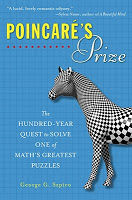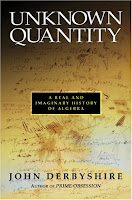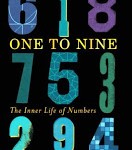“Nature’s great book is written in mathematics.” Galileo
Speaking of living math, there is a connection between numbers and spirituality.
 Take a look through the tiny Sacred Geometry by Miranda Lundy, or the hefty How the World is Made: the story of creation according to sacred geometry, by John Michell and Allan Brown. Both titles look at the spiritual and philosophical nature of math, specifically geometric shapes. From the Platonic solids to Stonehenge, the Western Zodiac to the Golden Ratio, this is as much a book of numbers as it is a book of art.
Take a look through the tiny Sacred Geometry by Miranda Lundy, or the hefty How the World is Made: the story of creation according to sacred geometry, by John Michell and Allan Brown. Both titles look at the spiritual and philosophical nature of math, specifically geometric shapes. From the Platonic solids to Stonehenge, the Western Zodiac to the Golden Ratio, this is as much a book of numbers as it is a book of art.
“A mathematician is a blind man in a dark room looking for a black cat which isn’t there.” Charles R. Darwin
Perhaps a biography is of more interest.

 There are biographies for mathematic fields, such as Unknown Quantity: a real and imaginary history of algebra by John Derbyshire. This is a dense book, which tries to map the erratic evolution of algebra; he claims “…the development of algebra was irregular and haphazard…”.
There are biographies for mathematic fields, such as Unknown Quantity: a real and imaginary history of algebra by John Derbyshire. This is a dense book, which tries to map the erratic evolution of algebra; he claims “…the development of algebra was irregular and haphazard…”.
There are biographies for mathematic discoveries and problems, such as Poincare’s Prize: the hundred-year quest to solve one of math’s greatest puzzles, by George G. Szpiro. This is the story of a math problem that remained unsolved for almost a century, and the unknown Russian who solved it…and rejected the prize and accolades.
A nd there are biographies of mathematicians themselves, such as the Canadian title King of Infinite Space: Donald Coxeter, the man who saved geometry by Siobhan Roberts. Coxeter revitalized modern geometry. He rejected algebraic analyses for a passionate eye for shapes. He loved polyhedrals, and surrounded himself physically with many-sided models; he was a direct inspiration for the graphic artist M.C. Escher, who is best known for his symmetry and his impossible structures.
nd there are biographies of mathematicians themselves, such as the Canadian title King of Infinite Space: Donald Coxeter, the man who saved geometry by Siobhan Roberts. Coxeter revitalized modern geometry. He rejected algebraic analyses for a passionate eye for shapes. He loved polyhedrals, and surrounded himself physically with many-sided models; he was a direct inspiration for the graphic artist M.C. Escher, who is best known for his symmetry and his impossible structures.
 For a biography, history and a math text all in one, try the impressive God Created the Integers: the mathematical breakthroughs that changed history by theoretical physicist Stephen Hawking. This guide examines 17 minds that influenced math the world over; names like Euclid and Archimedes, Descartes and Newton, Godel and Turing.
For a biography, history and a math text all in one, try the impressive God Created the Integers: the mathematical breakthroughs that changed history by theoretical physicist Stephen Hawking. This guide examines 17 minds that influenced math the world over; names like Euclid and Archimedes, Descartes and Newton, Godel and Turing.
Perhaps the following is the best introduction to reading about math, since it holds various topics, and is written for a variety of readers and calculators.
 The Edge of the Universe: celebrating ten years of math horizons, edited by Deanna Haunsperger and Stephen Kennedy, is a great choice for the hobbyist or professional mathlete. This is a compendium of the best articles from ten year span of the journal Math Horizons. Its short articles include biographies and histories, puzzles, curious math proofs, and interesting biographies.
The Edge of the Universe: celebrating ten years of math horizons, edited by Deanna Haunsperger and Stephen Kennedy, is a great choice for the hobbyist or professional mathlete. This is a compendium of the best articles from ten year span of the journal Math Horizons. Its short articles include biographies and histories, puzzles, curious math proofs, and interesting biographies.




